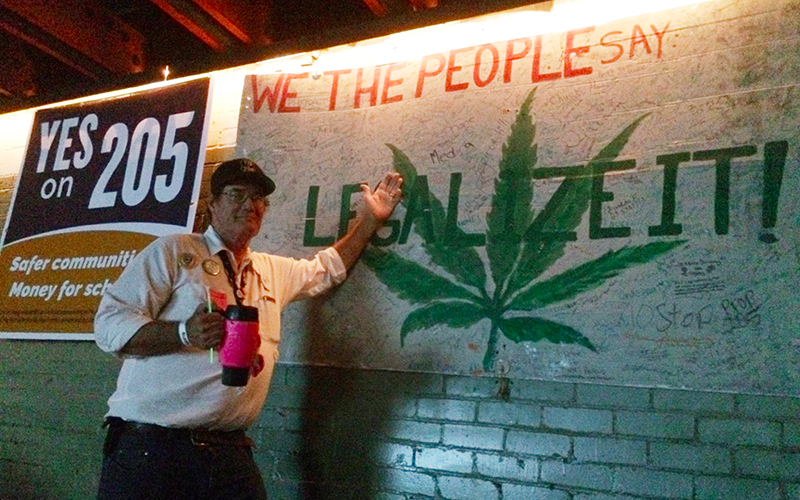
Mikel Weisser, Arizona state director of the National Organization for the Reform of Marijuana Laws, has carried a banner to various events since early 2015 collecting signatures from citizens in support of Proposition 205. (Photo by Bri Cossavella/Cronkite News)
Proposition 205, a ballot measure to legalize recreational marijuana use in Arizona, narrowly lost but voters approved similar measures in California, Massachusetts and Nevada.
Prop. 205 results were close, 52 percent rejecting the measure and 48 percent voting “yes” in the Nov. 8 election.
“We always knew it was going to be close, but we were always optimistic,” said Annie Vogt, spokeswoman for the No On Prop. 205 campaign. “We knew that we were getting our message out there, and we’re thrilled.”
Prop. 205 supporters had characterized the measure as a way to raise money for education from marijuana sales and said it should be regulated like alcohol.
Leaders of Yes on Prop 205 could not be reached for comment Wednesday.
But voters in Massachusetts and Arizona’s neighboring states, California and Nevada, approved similar measures on Tuesday.
Results for Maine’s measure were too close too call in a squeaker of a race, with 50.2 percent “yes” votes to 49.8 percent “no” votes, according to The New York Times.
California, Massachusetts and Nevada passed recreational marijuana measures with 56 percent, 55 percent, and 54 percent of voters saying “yes,” according to The New York Times.
The anti-Prop 205 group Arizonans for Responsible Drug Policy produced a series of political ads in the weeks leading up to Election Day, many of them featuring former Colorado politicians and school officials. The Colorado marijuana legislation included language requiring the first $40 million in marijuana tax revenue each year to go to Colorado public schools, but officials featured in the ads called them “empty words.” In one ad, former Denver mayor Wellington Webb said the money “is going to regulation and the pot industry instead,” Cronkite News reporter Cassie Ronda reported.
Last week, three Colorado elected officials sent a letter to the anti-205 group, calling the ads “inaccurate and misleading,” Ronda said.
It was the second time in 14 years a recreational-marijuana measure had failed. Medical marijuana is still legal in Arizona.
The rejection means that recreational use of marijuana remains illegal in Arizona. Fines for marijuana possession or cultivation can be as high as $150,000, with jail time from six months to 10 years.
Recreational and medical marijuana remain illegal under federal law. The federal government does not recognize acceptable medical uses of marijuana, and classified the drug under the Controlled Substances Act as a Schedule I substance: an illegal drug with high potential for abuse.
However, 23 states, including Washington D.C., legalized medical marijuana, 11 by ballot initiative. Colorado and Washington voters approved the legalization of recreational marijuana for adults by about a 10 percent margin in 2012, according to Ballotpedia. Alaska and Oregon followed suit in 2014.